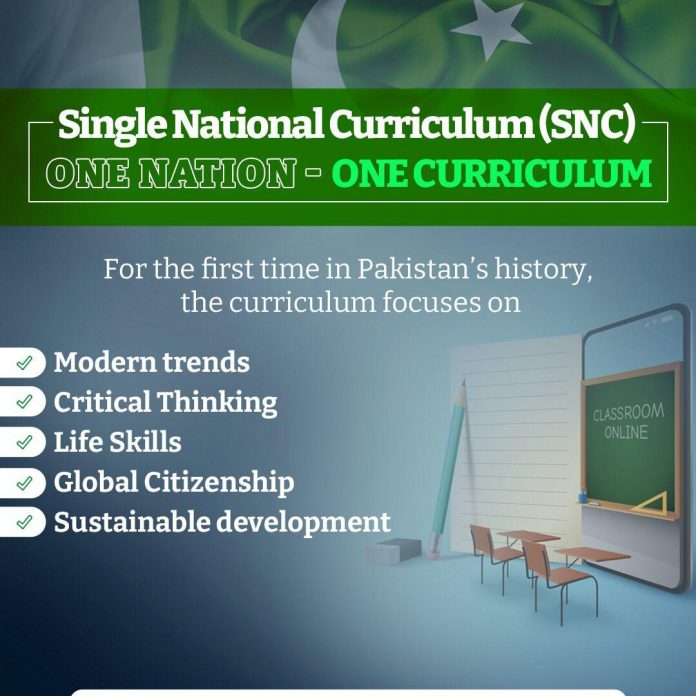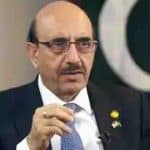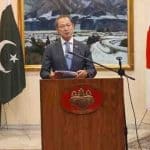ISLAMABAD, Prime Minister Imran Khan on Monday said the Single National Curriculum (SNC) would prove an important milestone in transforming the nation into a “unified entity, rooted in common morals and ethos”.
“A uniform curriculum will guide the nation in one direction and converge the diversified energies in achieving the common goals of progress,” the prime minister said at the launch of the first phase of SNC, here at the PM House.
The prime minister formally launched the online portal with the uniform syllabus, which has been developed by the National Curriculum Council, Ministry of Federal Education and Professional Training in consultation and collaboration with education departments of all federating units of the country.
Under the first phase, the Single National Curriculum has been implemented for grades pre-1 to 5 starting the current academic year, whereas in second and third phases, the grades 6 to 8 (2022-23) and grades 9 to 12 (2023-24) will follow the new curriculum, respectively.
The prime minister said the launch of SNC was the fulfillment of his 25-year-old dream to end educational disparity among different sections of society.
He regretted that the difference of Urdu and English-medium schooling resulted in creating a wide gulf among different social classes with the ills of intellectual inferiority or superiority complexes. English, he said, did not remain limited to a language to learn knowledge, but became a status symbol.
“Breaking the shackles of minds is more difficult and we are determined to bring the nation out of such complexes,” he said, stressing that no nation could rise until it relied on its original values and morals.
He expressed satisfaction that in the new curriculum, special emphasis had been laid on the teachings of Holy Prophet Muhammad (Peace be upon Him) as an inspiration of ethics and morality. He mentioned that the minorities would also be taught about their religions.
The lauded the strenuous hardwork of Education Minister Shafqat Mahmood and his team in materializing the vision of a single national curriculum. However, he directed to reduce the timeframe for implementation of second and third phases and make efforts to get them implemented in six months.
Education Minister Shafqat Mahmood said for the first time in the country’s history, the national curriculum had been launched in Punjab, Khyber Pukhtunkhwa, Balochistan, Gilgit Baltistan and Azad Jammu and Kashmir. He said consultations would be made with the Sindh government as well for its implementation.
He said several developed countries including the United Kingdom, China, Germany and Japan followed their own national curriculum, adding that a uniform framework would help the Pakistani students a level-playing field in academics.
Director National Curriculum Council Dr Mariam Chughtai said the new syllabus would act as a ‘living document’ with always room for improvement and would be made accessible for all students across the country through technology.
The SN will focus on Pakistan’s constitutional framework, national policies with their aspirations and standards, alignment with Sustainable Development Goals, the Quaid and Iqbal’s vision, a focus on values, respect for diversity in cultures and religions, and the development of 21st century skills including analytical, critical, and creative thinking.
The process for developing the SNC entailed both a comparative review with curricula from other countries and consensus building within Pakistan following a consultative process.
As a first step, multiple comparative studies were conducted to align an SNC draft with international standards. These standards were taken from curricula followed in Singapore, United Kingdom, Malaysia and Indonesia, and findings incorporated in the SNC draft.
A consultative process with stakeholders across Pakistan followed, including representation from the public sector, private sector, madaris, and the cantonment and Garrison boards.
The provincial and area workshops were subsequently held in all federating units. Finally, a National Conference was held in Islamabad where consensus on the final draft of the curriculum was secured.
The model textbooks based on the SNC besides the teacher training modules have also been developed for grades Pre-1 to 5. These have been shared with all federating units to support timely implementation of the SNC on the ground.
Under SNC, English will be taught as a language with a focus on skills. In Islamiat, new themes of “Muamilaat” and “Islam aur daur e Hazir ke Taqazay” have been added.
The experts from all factions of Ittehad Tanzimat Ul Madaris Pakistan were part of the consultation. To ensure intra-faith harmony, the SNC focuses on what is common between schools of thought and avoids promoting religious differences.
The practical aspects of Seerat as the blessed life of Prophet Muhammad (PBUH) have a special focus in the SNC, particularly in terms of how they apply to the lives of our young generation. These include taking care of the planet, water conservation, rights of elderly, citizenship, respect for religious and cultural diversity, and values of honesty and hard work.
For students from minority faiths, a separate curriculum with the title Religious Education has been developed. Five major religions are represented, with individual curriculum for each including Christianity, Hinduism, Sikhism, Baha’i and Kalash.
Social Studies has been developed to encourage patriotism, global citizenship, human rights and peace.
Follow the PNI Facebook page for the latest news and updates.









